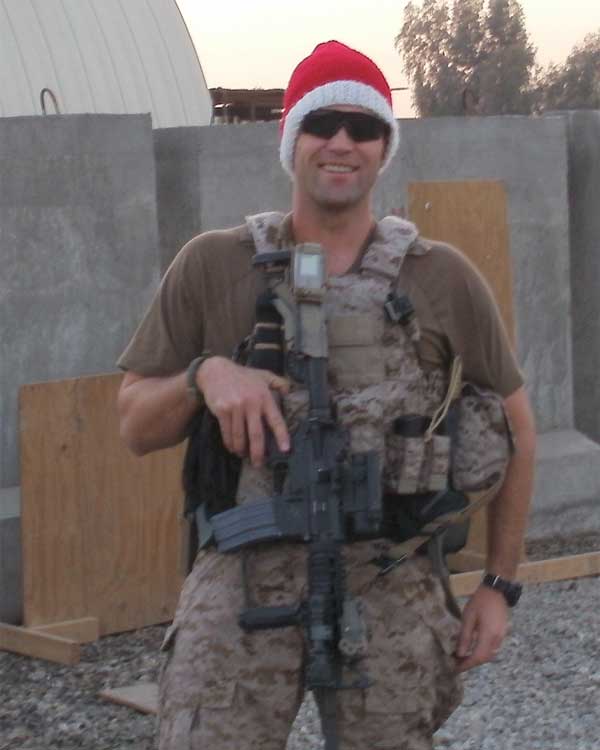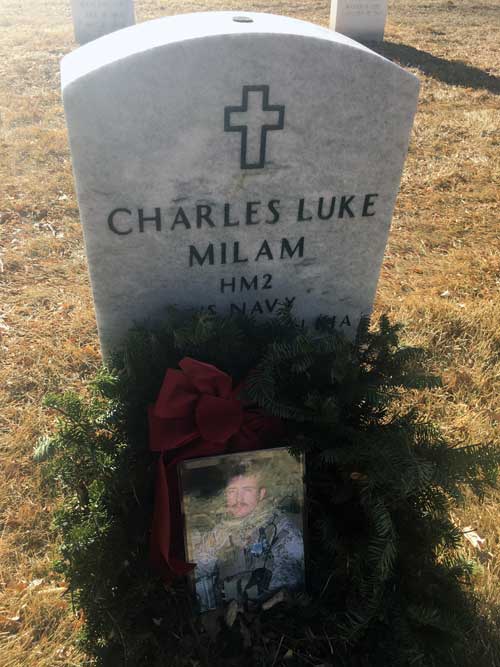Christmas in Combat: Another Date to Cross Off as We Hoped to Make It Home
I deployed eight times to combat environments around the world. I missed Christmas with my family on three of them.
I’ve celebrated on a Naval ship in the Mediterranean and in both Europe and Afghanistan with sailors and soldiers from a variety of backgrounds and religions. I even went to a raucous party complete with copious amounts of alcohol and dancing (yes, there were girls, courtesy of a Czechoslovakian SOF unit).
But it wasn’t always so jovial.

Ivan dons a Santa cap on Christmas Day 2010 in Kandahar, Afghanistan. (Photo courtesy of the author)
There is a heavy side to being deployed and fighting a war during the Christmas season. In Afghanistan, there were no Danny Kaye specials or isolated combat intermissions as described from the Battle of The Bulge or even the Christmas truce of 1914 on the Western Front between British and German troops. Our campaigns against the Taliban continued uninterrupted and without end. Christmas, while special on the day itself, also became one more date to cross off the calendar as we all hoped to make it home to our families.
Being in combat at Christmastime is also a leadership challenge. Everyone has their own wishes and nostalgia, so melancholy feelings are palpable for people missing loved ones and family. Good leaders would send an email to their entire unit reminding them of their duty and thanking them for theirs and their families’ sacrifices. The great leaders would actually get out among their unit, even in remote locations, and visit them at some time near the actual day.
In 2007, I was on a combat deployment that started in the summer—Operation Enduring Freedom, Helmand Province, Afghanistan. We suffered casualties, including the death of one of my men—Corpsman HM2 Charles Luke Milam, killed when a 107 mm rocket hit his truck just after he had treated some of our injured and returned to mount a machine gun to protect others. He was a graduate of Columbine High School who joined the Navy in 1999, just months after the infamous school shootings.
That Christmas, Luke’s family—and the families of 10 other men wounded during that deployment that stretched through the holiday—had to deal with the trauma of losing a loved one or caring for one broken by war. For some, it was the worst holiday of all the subsequent ones they would have to endure. I remember vividly calling each of them to express my condolences or, in the case of the wounded, wishes for a speedy recovery. Those calls seem hollow now, but then it was all I could do. I hope they knew my sincerity.

Ivan still calls families around the holidays of some of the men he lost, including the parents of Corpsman Charles Luke Milam, whose gravesite he visited during the holidays years ago in Fort Logan National Cemetery in Denver. (Photo courtesy of the author)
The enemy didn’t take a rest either, and mission requirements remained regardless of the day, but I don’t remember any of my commanders ordering us out on operations. When I became a commander, I never conducted an operation on Christmas; there was no way I’d want to have someone’s family associate their loss with the biggest holiday of the year. Not that the loss of their loved one would be any less awful the other 364 days, but Christmas was sacrosanct. Still, we sometimes conducted operations and kept up relentless pressure leading up to the holiday. This meant our intelligence sections checked our list of good boys and girls before we went on missions. Even at war, Santa knows!
Still, the toll was high. In 2010, as an operations officer for a joint task force in Afghanistan, it was my plan that got approved to send people into harm’s way in support of a beleaguered ground force. The action resulted in the awarding of two Silver Stars; one of them was posthumous. I was the one who got them in that fight. It happened just before Christmas. I carry that burden with me every day of my life, and I can remember the bloodied personal effects of an Army staff sergeant being put in a kit bag while his fellow Rangers inventoried a fallen warriors’ belongings. They were sober and matter-of-fact, though the loss of their squad leader was acute.
I remember that each base I was on did its best to provide a good, warm meal complemented with apple cider, sparkling grape juice, and desserts. The chow halls would be decorated, and a host of delicacies would be prepared for service members. On some of the more established bases, a celebrity like Gary Sinise, a band like 3 Doors Down, or even the president might join them unannounced and share a meal. At the end of their visit, they got to go home. The rest of us got ready for the next mission. I think we all enjoyed the break, though, and the sentiment was at least appreciated since sometimes it felt like we were overseas and no one cared outside of those who had the most at stake: our families.
My family would send me care packages with canned eggnog, cookies, small Christmas decorations, and gingerbread house kits. I always enjoyed them, particularly since my Marines and sailors would see the kit in its box and inevitably think it was “stupid” (their words).

Marines assemble a gingerbread house during one of Ivan’s Christmastime combat deployments. (Photo courtesy of the author)
Within 20 minutes, four or five of them would get together to build the house, complete with icing and candy adornments. Put on A Christmas Story or Christmas Vacation and it had the beginnings of a party, which generally happened in impromptu ways.
In 2012, the fraternity that came with building the gingerbread houses was shattered when my first sergeant ate the chimney off of the roof in a fell swoop after I’d spent two hours decorating it. I was furious. He smiled at me through gingerbread-and-chocolate-laced teeth and hissed, “Merry Christmas!” I could have killed him.
After that incident, we ate dinner in our chow hall and smiled at what would become an endearing, funny moment between us. Retiring to our fire pit, I would play the guitar with other members of my unit and we’d drink cold near-beer and smoke cigars, sometimes while it was snowing. If happiness is found within, we all did our best in austere environments to share it with each other.
Award-Winning Journalism in Your Inbox
The tension of being deployed was juxtaposed with a celebration of birth and renewal. Of hope. Decorations adorned drab outposts; the odd Santa hat was worn as a head covering while dressed in body armor. I saw a Rudolph nose on the front of a Blackhawk medevac helicopter. Even at church services on Christmas, the most hardened people broke down, and those who drove you nuts or were even outright antagonistic became worthy of “Goodwill towards men.”
In 2024, years removed from the war, and the end of our largest public policy debacle, Christmas is still special. I reflect on being deployed, where the time spent with friends and family was never more cherished than when we didn’t have it. Then it became one of the most important things to us and we had to rely upon each other to boost each other’s morale. It wasn’t about presents or gifts. It wasn’t about vacations or promised trips. It wasn’t about jingoistic goals.
Overseas, at war, it was about each other. I was fortunate enough to serve with some of the most unique and bravest people I have ever known. With few exceptions, I brought all of my men and women home. That, perhaps, is the greatest gift of all. Merry Christmas.
This War Horse Reflection was written by Ivan Ingraham, edited by Mike Frankel, fact-checked by Jess Rohan, and copy-edited by Mitchell Hansen-Dewar. Hrisanthi Pickett wrote the headlines.





Comments are closed.